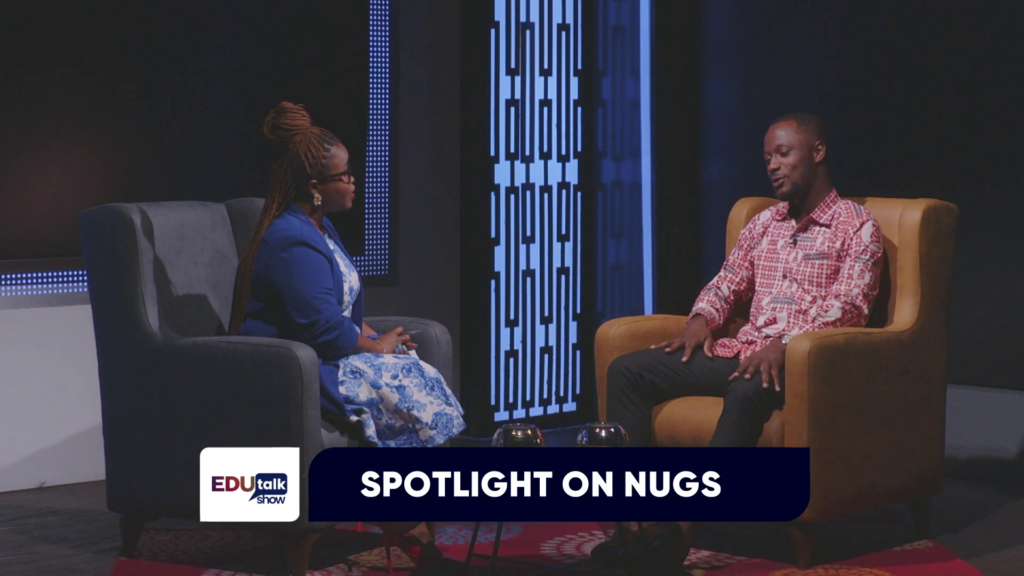The President of the National Union of Ghana Students (NUGS) has strongly criticised the compounding interest policy on student loans, describing it as a "wicked policy" that urgently needs to be reformed.
Speaking on the EduTalk Show with Emefa Apawu, National President of NUGS, Daniel Oppong Kyeremeh, said the policy is having a detrimental impact on students and has broader implications for Ghana's education system.
Mr. Kyeremeh argued that the compounding interest on student loans makes it difficult for many graduates to repay their loans, thereby discouraging students from subscribing to the loan system.

"Students are not able to pay because of the compound interest. That’s a wicked policy that we feel should be changed as soon as possible," he said. He hinted at imminent actions from NUGS, stating, "In the coming days, you’ll hear from us."
"By the time you’re done with school, the amount of money you’ll be paying is overwhelming," Kyeremeh noted.
Highlighting how the policy contradicts the original intent of the student loan system, the student leader indicated that "the main reason why the loan was brought is to serve as a shock absorber for students who are unable to get fees. We are not asking for the interest to be removed, but the compounding interest is too much. We should review the compound interest."
Mr. Kyeremeh’s further pointed out that in nations where education is highly prioritised, the student loan system is structured in a way that is more accessible and manageable for students.
"Every country that does not joke with their education doesn’t joke with their student loan system. When you get to other jurisdictions, almost every student is on the loan. Once you’re done with school, you pay," the NUGS president said, suggesting that Ghana should take cues from these systems to improve its own.

He emphasised that if the government wants more students to subscribe to the loan system, it needs to address the issue of compound interest. Kyeremeh believes that revising this policy is a crucial step towards making the student loan system more appealing and sustainable for Ghanaian students.
He further revealed the financial challenges facing the Student Loan Trust Fund (SLTF), the main body responsible for disbursing student loans in Ghana. He revealed that the SLTF is currently unable to fund more than 10 percent of students who apply for loans, primarily due to inadequate funding.
"The challenge is the funding. GETFund this year is allocating GHS15 million to SLTF. The SLTF each and every year is paying almost GHS80 million, and GETFund, which is the main source of funding, is giving them GHS50 million. How do they pay the rest of the over GHS80 million plus?" Mr. Kyeremeh questioned.
This funding gap, according to Mr. Kyeremeh, exacerbates the difficulties faced by students in accessing loans and contributes to broader challenges within the educational sector. He urged the government to prioritise education funding and ensure that the SLTF is adequately resourced to support the needs of students.
As NUGS prepares to take further action on this issue, it remains to be seen how the government will respond to these concerns and whether significant changes will be made to the student loan system in the near future.
Also, Mr. Daniel Oppong Kyeremeh made a passionate appeal for the uncapping of the Ghana Education Trust Fund (GETFund) to ensure adequate funding for the Free Senior High School (SHS) policy and address persistent issues such as the prevalence of schools under trees.
He stressed the need to allow GETFund to receive its full statutory allocation, which he believes is crucial for the holistic development of education in Ghana. He argued that the current practice of capping the fund has limited its potential impact on the education sector.
Latest Stories
-
Ofori-Atta unable to appear before OSP on June 2 due to health reasons – Frank Davies
23 minutes -
GoldBod can stabilise cedi if we get it right, says Association of Banks CEO, John Awuah
1 hour -
Man arrested in Western Region for illegal firearm possession
2 hours -
Football and other premium TV being pirated at ‘industrial scale’
2 hours -
Tanzanian politician’s lawyers ask UN to declare his detention arbitrary
2 hours -
Nigeria detains soldiers, police over weapons sales to armed groups
2 hours -
Ghana gold output could rise 6.25% to 5.1 million ounces in 2025
2 hours -
French Open scheduling pleas ‘like hitting head against wall’
3 hours -
US court won’t lift judge’s block on Trump’s government overhaul
3 hours -
‘Angry’ Alcaraz beats Shelton to reach quarters
3 hours -
Spurs to complete £21m Danso signing
3 hours -
Manchester United second most valuable club despite struggles
3 hours -
MANSTECH stun Mfantsipim to clinch soccer glory
3 hours -
Inter want Inzaghi to stay despite record final defeat
5 hours -
Barcelona in talks over free transfer swoop for Arsenal’s Thomas Partey
5 hours

